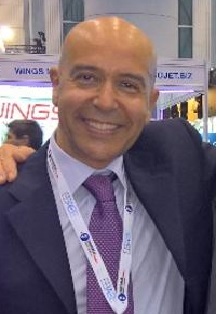American Airlines CEO Sounds Alarm On Airline Net-Zero 2050 Goal
Details
More Products & Services
Products & Services
Home - Aviation Group Marketing
Aviation Week Network
120 data points on over 156,000 commercial and business aviation aircraft, including military transports. Discover the most trustworthy resource for the complete aircraft history, plus ad hoc reports, month-over-month trend analysis and details on expected deliveries through 2050.
Aerospace | Aviation Week Network
Aviation Week Network
https://aviationweek.com/themes/custom/particle/dist/app-drupal/assets/awn-logo.svg
People

Andrea Rossi Prudente
Aviation Week Network

Becca Balmes
Aviation Week Network

Belinda Tan
Aviation Week Network

Brian Everstine
Aviation Week Network
Editor

Eddie Krankowski
Aviation Week Network
Assistant Manager, Tradeshows

erving dockery
Aviation Week Network

Lisa Tan
Aviation Week Network
Senior Marketing Manager

Mark Thomas
Aviation Week Network
Description
Airlines are not moving fast enough to be certain of achieving their commitment to being carbon net zero by 2050, the chief of American Airlines warned.
Robert Isom, CEO at American and chair of the oneworld global alliance, said airlines have taken bold decisions and actions regarding their goal to transition to net zero, taken in a resolution at the IATA AGM in Boston in October 2021. But he added, in a keynote speech at the IATA World Sustainability Symposium in Miami Sept. 24, that those decisions and actions within airline operations alone “are not going to be enough to move the needle”.
Isom said he therefore needed to raise the alarm. “We are not moving fast enough. We need to take more bold and aggressive actions or we risk not meeting our goals,” he said.
Among things to be done, Isom listed the need for more innovators and scientists to work on “beyond horizon” technologies. More stakeholders across the private and public sectors are needed to get involved in aviation carbon reduction. Governments need to invest in better air traffic control technologies so aircraft are not burning fuel—and creating emissions—unnecessarily because of airspace congestion. And the production of more sustainable aviation fuel (SAF) is “critical,” Isom said. “While the supply is growing, it still falls far short of what is needed.”
The cost of transitioning to net zero, with SAF significantly pricier than jet fuel, is “incredibly high, but it is not an option,” Isom said.
During a panel that Isom then joined with other CEOs at the symposium, IATA director general Willie Walsh said “more and more people” were listening to what the airlines are doing in sustainability and airlines should be optimistic. But he said he would like to see governments do “a bit more listening.”
“It's critical that governments step up. Robert's right to sound the alarm, particularly with the need to accelerate SAF production,” Walsh said.
Walsh added that the European Union's aviation sustainability model, which hinges on SAF mandates and forcing some short-haul flights to be replaced with rail or other ground transport modes, was an example of a model not to follow.
“I think they [the EU] are making big mistakes and we should learn from their mistakes. Certainly, the idea that you impose a regional solution on other regions is nonsense,” Walsh said.
Isom, in an apparent reference to the ICAO CORSIA global carbon offsetting and reduction scheme adopted by 191 nations in 2016, said, “It is time for countries to act on what their delegates voted on.”
Robert Isom, CEO at American and chair of the oneworld global alliance, said airlines have taken bold decisions and actions regarding their goal to transition to net zero, taken in a resolution at the IATA AGM in Boston in October 2021. But he added, in a keynote speech at the IATA World Sustainability Symposium in Miami Sept. 24, that those decisions and actions within airline operations alone “are not going to be enough to move the needle”.
Isom said he therefore needed to raise the alarm. “We are not moving fast enough. We need to take more bold and aggressive actions or we risk not meeting our goals,” he said.
Among things to be done, Isom listed the need for more innovators and scientists to work on “beyond horizon” technologies. More stakeholders across the private and public sectors are needed to get involved in aviation carbon reduction. Governments need to invest in better air traffic control technologies so aircraft are not burning fuel—and creating emissions—unnecessarily because of airspace congestion. And the production of more sustainable aviation fuel (SAF) is “critical,” Isom said. “While the supply is growing, it still falls far short of what is needed.”
The cost of transitioning to net zero, with SAF significantly pricier than jet fuel, is “incredibly high, but it is not an option,” Isom said.
During a panel that Isom then joined with other CEOs at the symposium, IATA director general Willie Walsh said “more and more people” were listening to what the airlines are doing in sustainability and airlines should be optimistic. But he said he would like to see governments do “a bit more listening.”
“It's critical that governments step up. Robert's right to sound the alarm, particularly with the need to accelerate SAF production,” Walsh said.
Walsh added that the European Union's aviation sustainability model, which hinges on SAF mandates and forcing some short-haul flights to be replaced with rail or other ground transport modes, was an example of a model not to follow.
“I think they [the EU] are making big mistakes and we should learn from their mistakes. Certainly, the idea that you impose a regional solution on other regions is nonsense,” Walsh said.
Isom, in an apparent reference to the ICAO CORSIA global carbon offsetting and reduction scheme adopted by 191 nations in 2016, said, “It is time for countries to act on what their delegates voted on.”

Share
Recent Chats
Share via email
Future: handle WhatsApp here
Future: handle LinkedIn here
Future: handle Twitter here
SUBMENU HERE
Share via Chat
Copy Link

